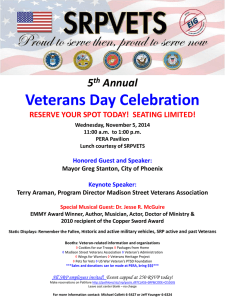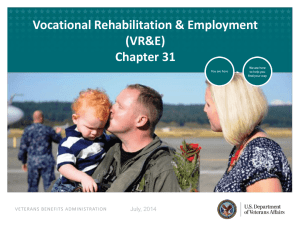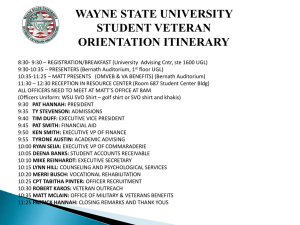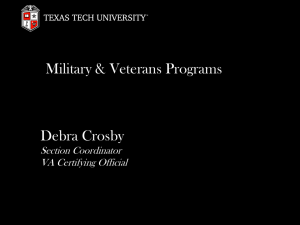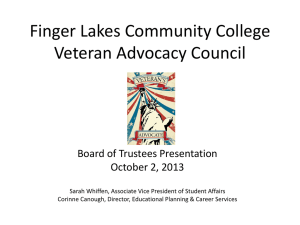Veterans
advertisement
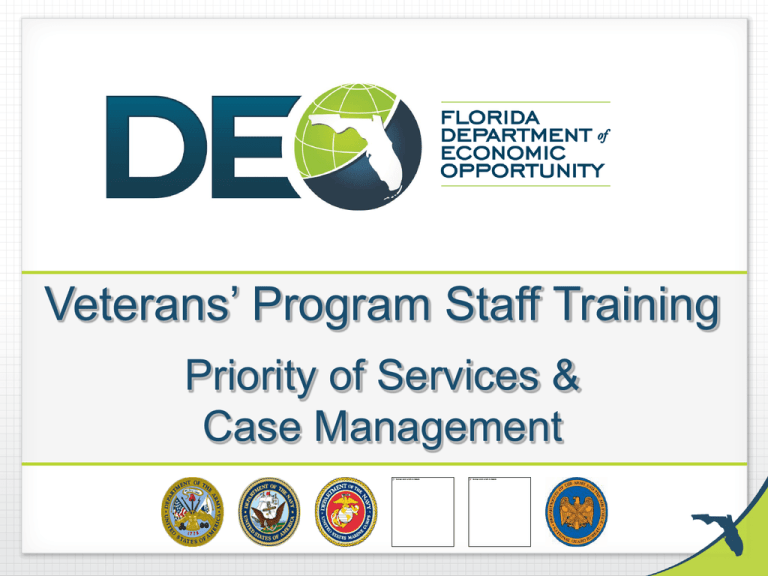
Veterans’ Program Staff Training Priority of Services & Case Management Objectives Understanding of Priority of Services entitlement Veterans and Covered Persons Understanding Intensive Services and Case Management Using Tools in Employ Florida Marketplace (EFM) Understanding of Perfomance Monitoring Understanding Strategies for Success Awareness of the State’s Areas of concern for References Title 38, United States Code Section 101(2) (38 U.S.C. 38 U.S.C.; 38 U.S.C., Chapters 41 and 42 101(2)); CFR Part Priority of Service for Covered Persons Final Rule, 20 1010, Fed. Reg. 78132 Dec. 19, 2008 Jobs for Veterans Act (JVA) – P.L. 107-288 Veterans’ Program Letter No. 07-09 (Implementing Priority) Training and Employment Guidance Letter No. 10-09 (Implementing Priority) Training and Employment Notice No. 15-10 (Protocol for Implementing) What is Veteran’s Priority of Service? The right of eligible veterans and covered persons to take precedence over non-covered persons for the receipt of employment, training, and placement services provided under qualified job training programs. Furthermore; eligible veterans or covered persons shall receive access to services or resources earlier in time than the non-covered person. Possible Misunderstanding Priority can be confused with Preference and Veterans Program Eligibility There is a difference! Priority Of Service applies to any program or service for workforce preparation, development, or delivery that is directly funded, in whole or in part, by the DOL Veterans Preference in hiring is special consideration to eligible veterans looking for employment with the Federal Government Veterans Program eligibility for DVOP/LVER services in the one stop career centers is established by the definitions for the program 5 Identifying Veterans Priority of Service requires the broad definition of veteran found in 38 U.S.C. 101(2) The term “veteran” means a person who served at least one day in the active military, naval, or air service, and who was discharged or released under conditions other than dishonorable (Functionally equivalent to WIA & applies to WIA program eligibility) ________________________________________________________ Differs from Wagner-Peyser definition of “eligible veteran” Which includes 180-day criterion and applies to Jobs for Veterans program eligibility and Wagner-Peyser program reporting Identifying Eligble Spouses In general, an Eligible Spouse is defined as: The spouse of a person who died of a service - connected disability The spouse of any member of the Armed Forces serving on active duty who is missing in action (90 Days), captured in the line of duty, or forcibly detained in the line of duty by a foreign government or power The spouse of any person who has a total disability, permanent in nature, resulting from a service- connected disability or died while a disability was in existence 7 Verification of Eligibility It is neither necessary nor appropriate to require verification of the status of a veteran or eligible spouse at the point of entry, unless the individual who selfidentifies: a) is to immediately undergo eligibility determination and be registered or enrolled in a program; AND b) the applicable federal program rules require verification of veteran or eligible spouse status at that time. Informing Covered Persons Florida’s eligible veterans and eligible spouses will be notified of programs and/or services available at the point of entry Point of entry includes but is not limited to: Physical locations, such as One Stop Career Centers Employ Florida Marketplace Web Site Career/Jobs Fairs Mass Recruitments Service Delivery Remember Veterans’ Priority of Service is EVERYONE’s Responsibility Initial Veterans Intake Initial intake, assessment and/or core services for Veterans should be performed by First Available One-Stop Center Staff ________________________________________________________ Client should be aware of Veterans program & Veterans Staff availability If a Veteran does not require intensive services or request Veteran Specific information and services the Veteran may not need to see an LVER or DVOP Any One Stop Center staff should be able to assist them EFM Point of Entry Many Veterans access the Employ Florida Marketplace (EFM) through the updated Veterans Portal, Employ Florida Vets http://veterans.employflorida.com/portals/veteran/ Approximately 75% of veterans self-register in EFM versus receiving staff-assisted registrations Florida uses EFM as the employment service delivery system. 12 Service Delivery System EFM’s features include: Identifying all self-registered veterans and eligible spouses, which includes Unemployment Insurance (UC) Migration. A messaging system: Direct communication with veterans, providing information on job alerts, job fair and veterans related information. Virtual Recruiter: A search agent that automatically reviews job postings and notifies the client of jobs that match their skills 13 EFM Priority of Service Self-registering veterans and eligible spouses are presented with a “Veteran Priority of Service” button, for information concerning their entitlements. 14 EFM Priority Service Codes When clicked, the Florida Veteran Priority of Service page will be displayed. The same information is located on EFM Veteran Service page. EFM Service code 089: Notification of Veteran Priority of Service is added to the service plan after a veteran self-registers and clicks on the Veterans Priority of Service tab. EFM Service code 189: Notification of Veteran Priority of Service is to be added when a staff assisted service is provided and includes the provision of information on Priority of Service to veterans and eligible person. 15 Intensive Services & Case Management All veterans who are pursuing employment will be registered in the EFM system. Veterans with barriers to employment will be provided with the necessary initial assessment and the required documented intensive services, as well as case management where needed. Case Management can be established in the EFM. Assessments and Employment Development Plans (EDPs) can be created in EFM. 16 EFM Services Reminders Complete Veteran registrations, including skills profile & Resume Case Management, Individualized Employment Plan (IEP) Provide meaningful service (services with asterisks commence or extend participation) Accurate and concise case notes in EFM Veteran File Search and Skills/Job matching Identify self-registered veterans Client messaging for effective communication Alerts as reminders or triggers to veterans 17 Monitoring During State monitoring and VETS Technical Assistance visits Review of the following will be included: Priority of Service codes 089 and189 Organizational and Employer Outreach E49 and E50 Intensive Services provided by DVOPs compared to LVERs Services provided by other One Stop Staff compared to Veterans Staff Services to Non-Veterans 18 LVER First quarter 2012 Services Served 22,217 veterans which equates to 17% of registered veterans; Reportable services provided include: Career Guidance: 23.9 % Intensive Services: 2.6% (585 registered eligible veterans) *Includes 71 Recently Separated veterans (less than 1/2%)* Job Search Activities: 45.8% Referred to Employment: 28.9% Referred to Federal Training: 5.4% Proportionately, all LVER services dropped from last quarter with the exception of Job Search activities, which dropped by 3%. DVOP First quarter 2012 Services Served 30,542 veterans which equates to 25% of registered veterans; Reportable services provided include: Career Guidance: 23.8 % Intensive Services: 5.1% (1,623 registered eligible veterans) *Includes 440 registered Disabled Veterans (Only 1.4%)* Job Search Activities: 46.7 % Referred to Employment: 23.8 % Referred to Federal Training: 5.4 % Proportionately, all DVOP services continue to drop from last quarter. DVOP intensive services should be higher. Performance Measurements State Negotiated PY 2011-12 Performance Measurement Targets DVOP Disabled Veterans EER 42% Disabled Veterans ERR 77% LVER Recently Separated Veterans EER 48% Recently Separated Veterans ERR 75% DVOP/LVER Consolidated Veteran EER-Weighted 46% Veteran ERR 77% Veterans’ Average Earnings (AE) $14,700 Performance Targets for One-Stop Services for Veterans Veterans Entered Employment Rate (EER) 44% Veterans Employment Retention Rate (ERR) 77% Veterans Average Earning (AE) $14,800 Disabled Veterans EER 40% Disabled Veterans ERR 76% Disabled Veterans AE $15,500 21 Performance Measurements Weighting: Assures that special consideration is given to disabled veterans requiring intensive services. The Entered Employment Rate (EER) is adjusted based on the proportion that veterans who entered employment after receiving intensive services represent among all veterans who entered employment. VPL 05-08 Wtd EER Calculation - Tool http://www.dol.gov/vets/VPLS/VPLDirectory.html 22 Service Strategies for Success Educate staff/partners (associates, managers, etc.) Stay current on veteran related programs; local, state and national Ensure staff have access to and are aware of available resources (job tools, websites, Networks, training, etc.) DVOP/LVER staff need to coordinate and effectively communicate with RWB One-Stop Center managers on veterans’ issues Seamless and fully integrated veterans’ employment services Share Best Practices, Success Stories, New Ideas, Etc. on Quarterly Manager’s Report and with other RWBs 23 Marketing Strategies for Success Marketing plans raise awareness among employers about veterans Stop Career Center services. as well as One- Effective program marketing includes planned and coordinated employer visits that benefit RWB objectives as well as veterans. Marketing One-Stops to veterans should include serving employed unemployed veterans. as well as Examples include, but are not limited to: Job/Career fairs Employer visits Media outlets (coordinate with RWB management) Community groups, Military organizations and service organizations 24 Florida’s Focus Areas Follow-up with contacts on referrals and Job Developments Intensive Services to veterans with barriers to employment Contacting EFM self-registered veterans Verifying veterans’ EFM registrations Requirements by Regional Workforce Boards (RWB) Reducing services to non-veterans by veteran employment representatives Your feedback on challenges and issues related to service delivery 25 Ultimate Strategy for Success Follow-up ! Follow-up !! Follow-up !!! 26 Questions And Discussion Contact Information Shawn Forehand Paul Furbush State Veterans’ Program Coordinator Asst. Veterans’ Program Coordinator Phone:(850) 245- 7424 /Fax: (850) 921-3495 Phone:(850) 921-3867 shawn.forehand@deo.myflorida.com paul.furbush@deo.myflorida.com Additional Resources: DEO Veterans’ Workforce program Resources http://www.floridajobs.org/workforce-board-resources/program-resources/programresources DOL VETS Veterans Program Letters http://www.dol.gov/vets/VPLS/VPLDirectory.html DEO best Practices www.floridajobs.org/workforce-board-resources/policy-and-guidance/best-practices An equal opportunity employer/program. Auxiliary aids and services are available upon request to individuals with disabilities. All voice telephone numbers on this document may be reached by persons using TTY/TDD equipment via the Florida Relay Service at 711.
